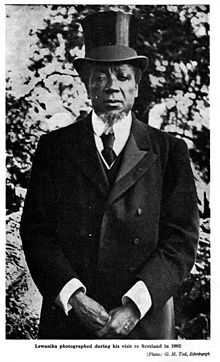Lewanika

Lewanika (1842–1916) (also known as Lubosi Lewanika or Lewanika I) was the Lozi Litunga (king or paramount chief) of Barotseland from 1878 to 1916 (with a break in 1884-5). A detailed, although biased, description of King 'Lubossi' (the spelling used) can be found in the Portuguese explorer Alexandre de Serpa Pinto's 1878-1879 travel narrative Como eu atravessei a África (How I Crossed Africa, in English translation).
Biography
In December 1882 the missionary Frederick Stanley Arnot reached Lealui, the capital of Barotseland, after traveling across the Kalahari Desert from Botswana. King Lewanika kept him for the next eighteen months, then allowed him to move on, but in a westward direction rather than eastward as he had planned. While detained, Arnot taught the king's children to read and undertook some evangelism.[1] Arnot was present when Lewanika received a proposal from the Ndebele for an alliance to resist the white men. Arnot may have helped Lewanika to see the advantages of a British protectorate in terms of the greater wealth and security it would provide.[2] Arnot left Bulozi in 1884 to recover his health and to escape a brewing rebellion against Lewanika.[3]
Lewanika brought Barotseland, now part of Zambia, under British control in 1890, when he agreed with Cecil Rhodes for the region to become a protectorate under the British South Africa Company (BSAC). However, he felt deceived by the BSAC terms as they worked in practice, and he appealed, unsuccessfully, to the British Crown.
In 1902, Lewanika visited London for the coronation of King Edward VII and Queen Alexandra, where he was treated with respect and had an audience with King Edward and an informal meeting with the Prince of Wales. When asked what he would discuss with the British sovereign, he said "When we kings meet we always have plenty to talk about".[4]
Lewanika's fourth son Mbikusita reigned as Litunga from 1968 to 1977 as Lewanika II. The Lewanika name continues to be used as part of a family name, for instance by Lewanika II's children Akashambatwa Mbikusita-Lewanika, a Zambian statesman and Inonge Mbikusita-Lewanika, an ambassador of the Republic of Zambia in the United States.
References
- ↑ Howard, Dr. J. Keir (2005). "Arnot, Frederick Stanley". Dictionary of African Christian Biography. Retrieved 2011-12-14.
- ↑ Galbraith, John S. (1974). Crown and charter: the early years of the British South Africa Company. University of California Press. p. 210. ISBN 0-520-02693-4.
- ↑ Mainga, Mutumba (2010). Bulozi Under the Luyana Kings: Political Evolution and State Formation in Pre-Colonial Zambia. African Books Collective. p. 222. ISBN 9982-24-052-8.
- ↑ Macmillan, Hugh. "Lewanika (c.1842–1916)". www.oxforddnb.com. Oxford Dictionary of National Biography. Retrieved 22 December 2013.